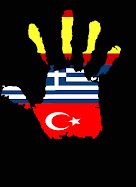“Nosotros, descendientes de los sabios y nobles pueblos de la Hélade, nosotros que somos los contemporáneos de las esclarecidas y civilizadas naciones de Europa (...) no encontramos ya posible sufrir sin cobardía y autodesprecio el yugo cruel del poder otomano que nos ha sometido por más de cuatro siglos (...). Después de esta prolongada esclavitud, hemos decidido recurrir a las armas para vengarnos y vengar nuestra patria contra una terrible tiranía. La guerra contra los turcos (...) no está destinada a la obtención de ventajas para una parte aislada del pueblo griego; es una guerra nacional, una guerra sagrada, una guerra cuyo objeto es reconquistar los derechos de la libertad individual, de la propiedad y del honor, derechos que los pueblos civilizados de Europa, nuestros vecinos, gozan hoy”.
(Asamblea Nacional Griega, 27 de enero de 1822. Proclamación de la independencia de Grecia)
 Batalla de Navarino por Carneray
Batalla de Navarino por CarnerayNo podíamos cerrar el capítulo de las guerras de independencia sin dejar de glosar, aunque sea brevemente la de Grecia. A pesar de lo duras que parecen las palabras de la Asamblea Nacional Griega contra los turcos, lo cierto es que los dos países comparten una cultura común debido a la cercanía geográfica y a siglos de convivencia, que no se reduce a la competencia sobre si la receta original de la musaka es griega o turca. En nuestro viaje a Xanthi lo pudimos comprobar. George y Ewie nos explicaron que muchas de las personas que viven en los pueblecitos de la montaña son turcas de origen o tienen familia turca, por eso se entienden bien con ellos e incluso hablan un mismo dialecto. Las fronteras no siempre han estado donde actualmente las conocemos y durante mucho tiempo parte de la actual Grecia perteneció primero al Imperio Bizantino y luego tras la caída de los turcos, Grecia pasó a formar parte del Imperio Otomano durante el siglo XV.
Como en la mayoría de guerras, en ésta también hubo aliados, y en este caso fue la escuadra anglo-francesa y rusa la que hizo inclinarse la balanza del lado de los griegos en la batalla naval de Navarino. Por su parte, el sultán Mahmud II pidió ayuda a Egipto.
A pesar de haber obtenido la independencia, los griegos no se libraron de una guerra civil entre 1831 y 1832 debido a la disparidad de criterios entre los bandos políticos enfrentados. Las razones por las que Occidente se puso de parte de los griegos fueron, por un lado, por motivos religiosos: la lucha contra los infieles otomanos y, por otro, por cierto sentimiento romántico de simpatía hacia la herencia clásica que desembocó en un filohelenismo cuyo más famoso representante fue el poeta inglés lord Byron.
“We, who come from the knowledgeable and noble people from Helade, we, contemporaries of the peaceful and civilised nations of Europe, do not find it possible to suffer without cowardliness and self contempt the cruel yoke of the Ottoman power which has submitted us for more than four centuries (...). After this long slavery, we have decided to use weapons to take revenge and release our country from a terrible tirany.
The war against the Turks (...) is not determined to get advantages for only a part of the Greek people; it is a national war, a holy war, a war whose objective is to reconquer the rights of individual freedom, of property and honour, rights which the civilised countries in Europe, our neighbours, enjoy today.”
(National Assembly, January the 27th, 1822. Declaration of Greek independence.)
We could not end the part dedicated the Independence wars without briefly dealing with the Greek one. In spite of the hard words of the Greek National Assembly against the turks, the truth is that both countries share a common culture due to their neighbourhood and to centuries of coexistence. It is not merely a competition about the origin or the recipe of Mousaka. In our trip to Xanthi, we could observe it. George and Ewie explained us that the people who live in the mountain villages are of Turkish origin or related to them, that is why they understand each other and they speak the same language. Borders have not always been where we know them now and part of the present Greece was for a long time part, first in the Byzantine Empire, and then, after the fall of the Turks, Greece became part of the Ottoman Empire in the 15th century.
As in most wars, in this one there were allies, and in this case, it was the Anglo-French and russian squad which made them decide on the side of the Turks inn the naval battle of Navarino. On his side, sultan Mahmud II asked Egypt for help.
The Greek did not suffer a Civil War between 1831 and 1932 given to the differences between the confronting politic sides. The reasons why the West took the side of the Greek were, on the one hand religious: the fight against the Ottoman unfaithful people, and on the other, a certain romantic feeling of sympathy for the classical heritage which arrived to a filohelenism whose main figure was the British poet Lord Byron.






 Ahmet Çallioglu Çok Programli Lisesi (Aydin, Turkey)
Ahmet Çallioglu Çok Programli Lisesi (Aydin, Turkey)
 Primary School of Afxentio (Xanthi, Greece)
Primary School of Afxentio (Xanthi, Greece)
 I.E.S. Monastil
I.E.S. Monastil



0 comentarios:
Publicar un comentario